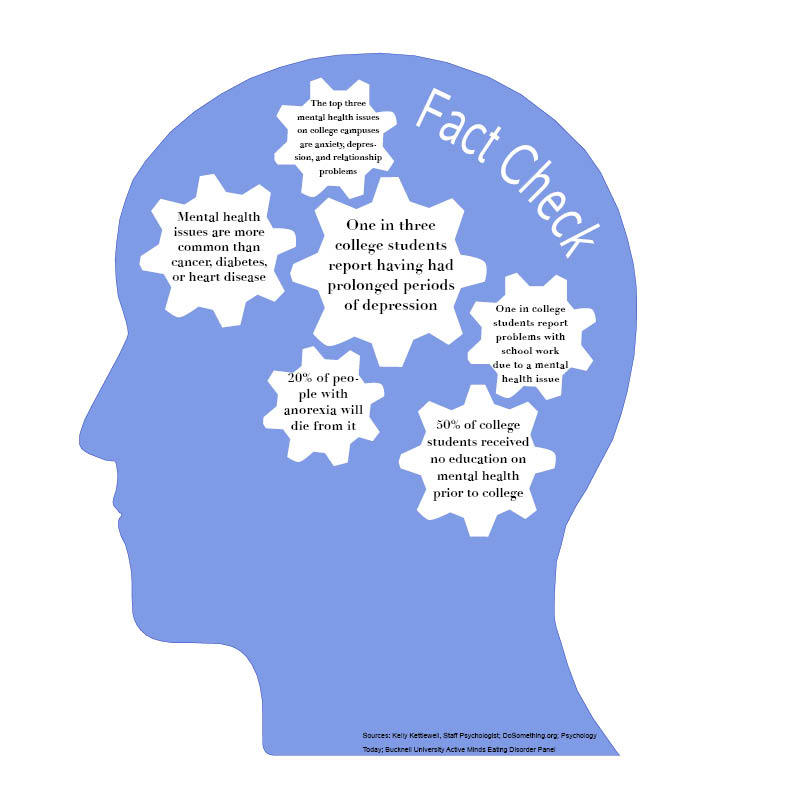Mental health does not discriminate
March 3, 2016
Students experience a whirlwind of emotions and psychological changes in college, both good and bad. One disappointing grade on an exam or a fight with a friend or partner could easily send a person into a state of anxiety, especially because away from home, students must develop resiliency and establish their own support systems. Different pressures on campus, whether they are academic, social, or physical often produce unhealthy expectations for young adults. In light of National Eating Disorders Awareness Week (Feb. 21-27), we compiled information and statistics on mental health and spotlighted events and programs on campus that work to combat this prevalent issue.
Active Minds panel encourages discourse and awareness on eating disorders
Julia Lasko, Assistant Arts & Culture Editor
“Eating disorders do not discriminate,” was the phrase first spoken by Wendy Cramer, a representative from the Renfrew Center Eating Disorder Treatment Facility, and the underlying message throughout the course of the Active Minds Eating Disorder Panel on Feb. 29. The panelists consisted of campus representatives from the Counseling & Student Development Center, Bucknell Student Health, Nutrition Services, and Athletics and Recreation. The event was run by the student-led organization Active Minds, which strives to bring education and awareness to the student body about mental health issues, the symptoms of mental illness, and available resources.
Topics discussed included indicators of eating disorders, the difference between eating disorders and disordered eating, and the media impact on eating disorders, among others. The panelists offered their expert opinions and advice, which provided the audience with a deeper knowledge of what constitutes an eating disorder and what the causes may be.
When asked if there is anything specific about the University’s campus culture in particular that impacts the development of an eating disorder among its students and community members, Dr. Kelly Kettlewell, the associate director of the Counseling & Student Development Center said there is “so much focus on doing … that there is so little reflection … so little focus on being” on college campuses in general that often leads to the development of unhealthy patterns and potential eating disorders. Assistant Athletic Trainer Emily Madrak offered her opinion that the “idea of perfectionism is so high here,” which she believes transcends into also desiring a “perfect body.”
“I liked how they talked about how you can change everyday conversation away from triggering phrases like ‘you’re so skinny’ because it can really shape someone with a disorders attitude completely,” an audience member said.
“We at Active Minds were so honored to have incredible speakers like Wendy Cramer come to talk with us about eating disorders. Eating disorders are incredibly dangerous and are becoming more prevalent on college campuses. Most of the time people don’t want to talk about them because it’s upsetting and personal. Active minds was just happy to help start a conversation about eating disorders on campus, and we hope that this is just the beginning of this conversation,” president of Active Minds Jackie Cantow ’19 said.
“The panel discussion was a great way to bring attention to the seriousness of eating disorders and the comprehensive support services available here at Bucknell. I always enjoy working with campus partners and engaged students to raise awareness on campus. It’s my hope that those in attendance walked away with a commitment to take good care of themselves and connect in meaningful ways with those around them,” Kettlewell said.
Eating disorders do not discriminate against age, gender, sexual preference, or race. They can affect any person at any time, and it is important to educate yourself on the symptoms and causes, and how to appropriately help someone who is struggling. Engaging in positive self-talk and straying away phrases such as “you look so skinny” promotes the creation of body positive conversations and is another step toward resolving the eating disorder epidemic plaguing today’s society.
How the University addresses mental health and wellness:
Mental health is a very serious subject and it’s crucial that college campuses find ways to address it.
“For college students, the college years represent a time of significant change, independence, growth, and challenge. Students are exposed to new experiences and opportunities that ask them to stretch beyond their comfort zone. Mental health issues can emerge when typical ways of coping or managing don’t work anymore,” Kettlewell said.
So how does the University work with students who can’t learn to cope with these types of challenges?
“Currently, we offer drop-in workshops, open to all students, on Tuesday and Thursdays (12-1 p.m. in Taylor 113) that focus on topics like managing anxiety, challenging negative thoughts, improving interpersonal relationships, effective communication, and mindfulness. We are also sponsoring three sections of a four-week Mindfulness Class this spring and hope to continue the popular course in the future,” Kettlewell said.
BeYou-tiful Week (Feb. 21-25) promotes women’s confidence on campus:
As a way of discrediting all the recent pressures on young women to look a certain way and maintain a certain weight, the Panhellenic Council at the University spearheaded BeYou-tiful Week, a week dedicated to promoting confidence and strength in women.
“BeYou-tiful Week was presented by the University Panhellenic Council and the Women’s Resource Center in partnership with ATHENA, BSH, CSDC and Yoga Dear. The goal of this week was to bring awareness to self-esteem issues among women on campus. Some events we put on were a yoga class sponsored by Yoga Dear in The Commons, and a ‘Selfie Wall’ where women had the opportunity to take pictures of themselves and write positive adjectives on them,” president of the Panhellenic Council Hannah Menendez ’17 said.
Menendez was very happy with BeYou-tiful week and the praise it received from participants.
“As a council, we believe that we succeeded in bringing light to self-esteem issues on campus and promoting confidence and women’s empowerment,” Menendez said.






















